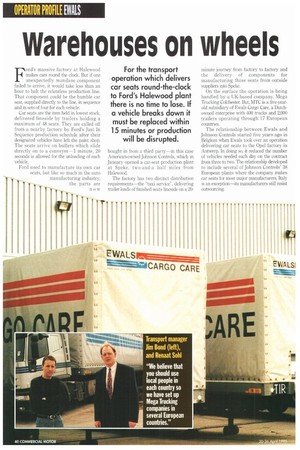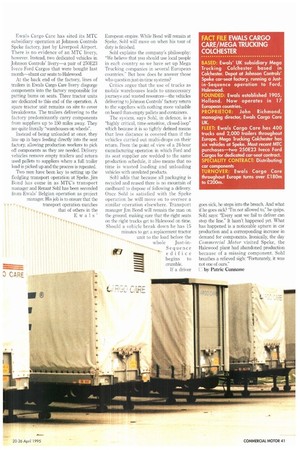Warehouses on wheels
Page 42

Page 43

If you've noticed an error in this article please click here to report it so we can fix it.
For the transport operation which delivers car seats round-the-clock to Ford's Halewood plant there is no time to lose. If a vehicle breaks down it must be replaced within 15 minutes or production will be disrupted.
Ford's massive factory at Halewood makes cars round the clock. But if one unexpectedly mundane component failed to arrive, it would take less than an hour to halt the relentless production line. That component could be the humble car seat, supplied directly to the line, in sequence and in sets of four for each vehicle.
Car seats are the item held in lowest stock. delivered lineside by trailers holding a maximum of 48 seats, They are called off from a nearby factory by Ford's Just In Sequence production schedule after their designated vehicles have left the paint shop. The seats arrive on buffers which slide directly on to a conveyer 1 minute, 20 seconds is allowed for the unloading of each vehicle.
Ford used to manufacture its own car seats, but like so much in the auto manufacturing industry.
--orthe parts are
now bought in from a third party—in this case American-owned Johnson Controls, which in January opened a car-seat production plant at Speke, two-and-a half miles from Halewood.
The factory has two distinct distribution requirements—the "taxi service", delivering trailer-loads of finished seats lineside on a 20 minute journey from factory to factory and the delivery of components for manufacturing those seats from outside suppliers into Speke.
On the surface the operation is being handled by a UK-based company, Mega Trucking Colchester. But, MTC is a five-yearold subsidiary of Ewals Cargo Care, a Dutchowned enterprise with 400 trucks and 2,000 trailers operating through 17 European countries.
The relationship between Ewals and Johnson Controls started five years ago in Belgium when Ewals took over an operation delivering car seats to the Opel factory in Antwerp. In doing so, it reduced the number of vehicles needed each day on the contract from three to two. The relationship developed to include several of Johnson Controls' 38 European plants where the company makes car seats for most major manufacturers. Italy is an exception—its manufacturers still resist outsourcing. Ewals Cargo Care has sited its MTC subsidiary operation at Johnson Controls Speke factory, just by Liverpool Airport. There is no evidence of an MTC livery, however. Instead, two dedicated vehicles in Johnson Controls' livery—a pair of 250E23 Ivcco Ford Cargos that were bought last month—shunt car seats to Halewood.
At the back end of the factory, lines of trailers in Ewals Cargo Care livery disgorge components into the factory responsible for putting bums on seats. Three tractor units are dedicated to this end of the operation. A spare tractor unit remains on site to cover breakdowns. The trailers delivering to the factory predominantly carry components from suppliers up to 150 miles away. They are quite literally "warehouses on wheels".
Instead of being unloaded at once, they line up in bays feeding directly into the seat factory, allowing production workers to pick off components as they are needed. Delivery vehicles remove empty trailers and return used pallets to suppliers where a full trailer load is picked up and the process is repeated.
Two men have been key to setting up the fledgling transport operation at Speke. Jim Bond has come in as MTC's transport manager and Reriaat Sohl has been seconded from EwaIs' Belgian operation as project manager. His job is to ensure that the transport operation matches that of others in the Ewals' European empire. While Bond will remain at Speke. Sohl will move on when his tour of duty is finished, Sohl explains the company's philosophy: "We believe that you should use local people in each country so we have set up Mega Trucking companies in several European countries," But how does he answer those who question just-in-time systems?
Critics argue that the use of trucks as mobile warehouses leads to unnecessary journeys and wasted resources—the vehicles delivering to Johnson Controls' factory return to the suppliers with nothing more valuable on board than empty pallets and containers.
The system, says Sohl, in defence, is a "highly critical, time-sensitive, closed-loop" which because it is so tightly defined means that less distance is covered than if the vehicles carried out multi-drops on their return. From the point of view of a 24-hour manufacturing operation in which Ford and its seat supplier are wedded to the same production schedule, it also means that no time is wasted loading and unloading vehicles with unrelated products.
Sohl adds that because all packaging is recycled and reused there is no mountain of cardboard to dispose of following a delivery Once Sohl is satisfied with the Speke operation he will move on to oversee a similar operation elsewhere. Transport manager Jim Bond will remain the man on the ground. making sure that the right seats on the right trucks get to Halewood on time. Should a vehicle break clown he has 15 minutes to get a replacement tractor unit to the load before the
whole Just-inSequence •• edifice begins to crumble.
If a driver goes sick, he steps into the breach. And what if he goes sick? "I'm not allowed to," he quips. Sohl says: "Every seat we fail to deliver can stop the line." It hasn't happened yet. What has happened is a noticeable upturn in car production and a corresponding increase in demand for components. Ironically, the day Commercial Motor visited Speke, the Halewood plant had abandoned production because of a missing component. Sohl breathes a relieved sigh: "Fortunately it was not one of ours."
by Patric Curmane




























































































